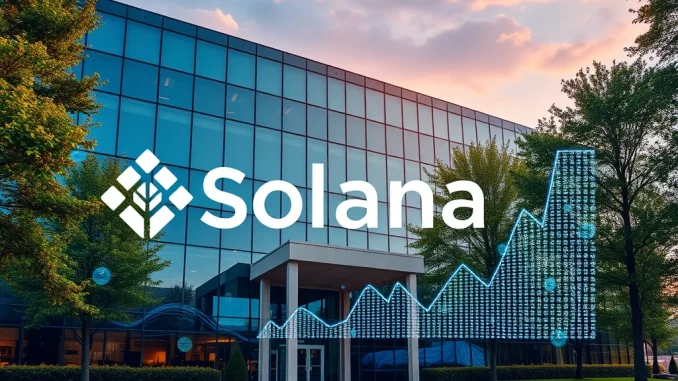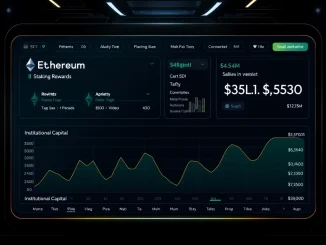
The intersection of traditional finance and the burgeoning world of digital assets continues to heat up. A notable recent move sees DeFi Development (DFDV), a company formerly known as Janover, significantly expanding its investment in the Solana ecosystem. This strategic decision highlights a growing trend among publicly traded companies: adding cryptocurrencies to their balance sheets, not just as a speculative play, but with plans for active yield generation.
DFDV’s Expanding Solana Portfolio
DeFi Development, listed on Nasdaq, has made headlines with its latest substantial acquisition of Solana (SOL) tokens. The company recently purchased 172,670 SOL for approximately $23.6 million. This significant buy propels DFDV’s total Solana holdings to nearly $105 million, according to reports from CoinDesk. This level of exposure to a single digital asset signals a clear strategic direction for the firm.
Why Corporate Crypto Holdings?
DFDV’s move is part of a broader narrative. Public companies are increasingly exploring and executing strategies to incorporate cryptocurrencies into their corporate treasuries. Early pioneers like MicroStrategy and Tesla demonstrated the potential, and now others are following suit, albeit with varying approaches and chosen assets. The motivations behind such moves can include:
- Potential for asset appreciation as a hedge against inflation or currency devaluation.
- Earning yield through activities like staking, as planned by DFDV.
- Diversification away from traditional assets.
- Signaling innovation and forward-thinking to investors.
- Direct participation in emerging digital economies.
For DFDV, the focus on holding and staking suggests a dual goal: long-term appreciation potential of SOL combined with generating passive income from the assets. Staking involves locking up tokens to support the network’s operations in exchange for rewards, effectively earning yield on the held assets.
Deep Dive into Solana (SOL)
So, why might a company like DFDV choose Solana? Solana is a high-performance blockchain platform known for its speed and low transaction costs, designed to support decentralized applications (dApps) and smart contracts at scale. Its key features include:
- High Throughput: Capable of processing thousands of transactions per second.
- Low Costs: Transaction fees are typically fractions of a cent.
- Scalability: Designed to handle significant network load.
- Vibrant Ecosystem: A growing community of developers building projects across DeFi, NFTs, gaming, and more.
- Staking Mechanism: Utilizes a Proof-of-Stake (PoS) consensus mechanism, allowing token holders to stake SOL and earn rewards, which aligns directly with DFDV’s stated plans.
These characteristics make Solana an attractive platform for various digital asset activities and a potential candidate for corporate treasury strategies seeking exposure to high-growth blockchain ecosystems and yield opportunities.
Who is DeFi Development (DFDV)?
Understanding DFDV provides context for this investment. Formerly known as Janover Inc., the company operated in the digital mortgage and financial technology space. The name change to DeFi Development signals a strategic pivot towards the decentralized finance sector and broader digital asset landscape. This pivot explains the company’s increasing focus on acquiring and managing digital assets like Solana.
This transformation from a traditional fintech company to one actively involved in digital asset management reflects the evolving landscape where companies are seeking new avenues for growth and yield in the digital economy. Their significant Crypto Holdings are a tangible outcome of this strategic shift.
What Does This Mean for Corporate Crypto?
DFDV’s move reinforces the trend of Corporate Crypto adoption. While Bitcoin often dominates the headlines for corporate treasuries, companies are increasingly looking at other large-cap altcoins like Solana, Ethereum, and others that offer unique value propositions, such as staking yields or exposure to specific ecosystem growth. This diversification beyond just Bitcoin suggests a maturing corporate approach to digital assets.
The decision to stake the acquired SOL is particularly noteworthy. It indicates a long-term perspective and a desire to generate ongoing revenue from the asset, rather than simply holding it for potential price appreciation. This yield-generating strategy could become a more common model for companies holding PoS assets.
Looking Ahead
DeFi Development’s substantial investment in Solana is a significant development for both the company and the Solana ecosystem. It adds another publicly traded company to the list of firms with considerable digital asset exposure and validates Solana’s position as a key player in the blockchain space attractive to institutional interest.
As DFDV continues to build out its strategy, market participants will be watching how these substantial DeFi Development holdings impact their balance sheet and overall business performance. The success of their staking strategy could serve as a case study for other companies considering similar moves into yield-bearing digital assets.
Summary
In conclusion, DeFi Development’s latest $23.6 million purchase of Solana tokens, bringing their total holdings to around $105 million, marks a significant step in their pivot towards digital assets. This move aligns with the growing trend of public companies adding crypto to their balance sheets, with DFDV specifically targeting yield generation through staking. Their substantial investment in Solana highlights the network’s increasing appeal beyond native crypto firms and underscores the expanding role of Corporate Crypto in the global financial landscape. It will be interesting to observe the long-term outcomes of this strategic focus on digital asset management and yield farming for the company.



